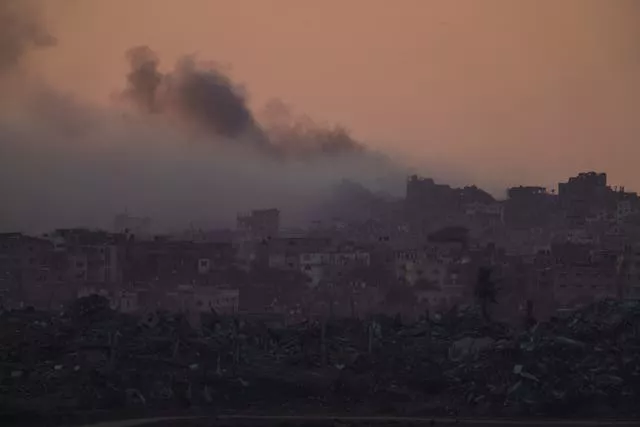A shipment of medicine for dozens of hostages held by Hamas is heading to Gaza after France and Qatar mediated the first agreement between Israel and the militant group since a week-long ceasefire in November.
The medicines arrived in Egypt, and are now being transported to the border.
A senior Hamas official said that for every box provided for the hostages, 1,000 boxes would be sent in for Palestinians. The deal also includes the delivery of humanitarian aid to Palestinians in the besieged coastal enclave.
Cogat, an Israeli defence body in charge of Palestinian civilian affairs, said the trucks carrying the shipment will be inspected by Israeli authorities before entering Gaza.
The agreement came more than 100 days into a conflict that shows no sign of ending and which has sparked tensions across the Middle East, with strikes and counter-strikes in recent days from northern Iraq to the Red Sea and from southern Lebanon to Pakistan.
In Gaza, Palestinian militants are still putting up resistance across the narrow coastal strip in the face of one of the deadliest military campaigns in recent history.
Some 85 per cent of the territory’s population of 2.3 million people have fled their homes and the United Nations says a quarter of the population is starving.
Israel has vowed to dismantle Hamas’ military and governing abilities to ensure that it can never repeat the October 7th attack that triggered the war.
Militants burst through Israel’s border defences and stormed through several communities, killing some 1,200 people, mostly civilians, and capturing around 250.
When the war began on 7 October, life changed dramatically overnight for Hala – a mother of four and a humanitarian worker from #Gaza.
In her diary, she documents her fear, trauma and resilience.
Here’s her story 👇
— UN Humanitarian (@UNOCHA) January 16, 2024
Israel has also vowed to return the more than 100 hostages still held inside Gaza after Hamas released most of the rest in November in exchange for Palestinians imprisoned in Israel.
The Israeli government has said only military pressure will bring about the release of more captives, but as the fighting grinds on they are at increased risk of being killed in Israeli strikes or during rescue operations.
Hamas has said it will not release any more hostages until there is a permanent ceasefire, something Israel and the United States, its top ally, have ruled out.
100 days in 100 seconds.
This has been the largest displacement of the Palestinian people since 1948.
An entire generation of children is traumatized, thousands have been killed, maimed, and orphaned.
People live through the unliveable. pic.twitter.com/qmqvwPQKL6
— UNRWA (@UNRWA) January 15, 2024
In just the past few days:
– A US-led coalition has carried out strikes against Iran-backed Houthi rebels in Yemen;
– Iran has struck what it described as an Israeli spy headquarters in northern Iraq and anti-Iranian militants in Pakistan and Syria;
– Israel and Lebanon’s Hizbullah have escalated the intensity of their fighting across the border.
Iran’s militant allies across the region say they are striking US and Israeli targets to pressure them to halt the Gaza offensive.
Tehran itself has encouraged the attacks while avoiding direct involvement, but appears to be flexing its muscles with the strikes in Syria and Pakistan.
The Houthis have vowed to continue attacking international shipping in the Red Sea in what they say is a blockade of Israel, with repercussions for global trade.

Each party appears to be seeking some form of deterrence against its adversaries. But the longer the war in Gaza lasts, the more likely it is that one of them goes a step too far, potentially triggering another war.
The biggest risk is along the Israel-Lebanon border, where Israel has vowed to halt Hizbullah attacks so that tens of thousands of Israelis can return to their homes in communities evacuated in October.
Hizbullah hopes to take the pressure off Gaza by tying down Israeli troops in the north.
Tensions are also soaring in the occupied West Bank, where Israeli forces have conducted near-daily arrest raids that often trigger shootouts with Palestinian militants.
Israel said on Wednesday that an air strike in the urban Balata refugee camp in the northern West Bank killed five people.
The unfolding tragedy cannot carry on.
➡️We continue to work relentlessly to bring home the hostages
➡In those darkest hours, our 17y old commitment to alleviate the suffering of the people in Gaza is unwaveringNo hierarchy in suffering, only one colossal humanitarian crisis pic.twitter.com/2iy6bLp3BE
— Fabrizio Carboni (@FCarboniICRC) January 15, 2024
They included a senior militant who was involved in recent attacks on Israelis, the army alleged. More than 350 Palestinians have been killed in the West Bank since October 7th.
Israel said at the start of the year that it had largely dismantled Hamas in northern Gaza and would scale back operations there, focusing on dense urban areas in the centre and south of the territory.
Additional Israeli forces withdrew from Gaza on Monday, but there has been little apparent let-up in strikes, with scores of Palestinians killed every day.
Gaza’s health ministry said 24,285 Palestinians have been killed since the start of the war.
The ministry does not differentiate between civilian and combatant deaths but says around two-thirds of those killed were women and children.
More than 60,000 people have been wounded, and less than half of Gaza’s hospitals are even partially functioning.
Signup bonus from




